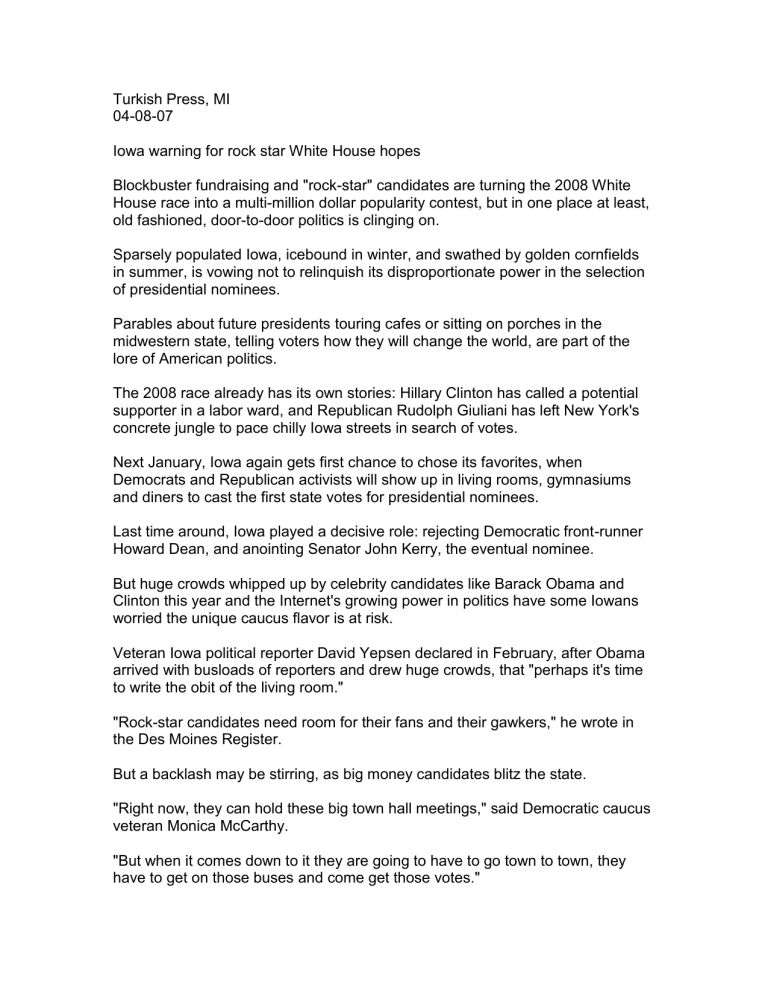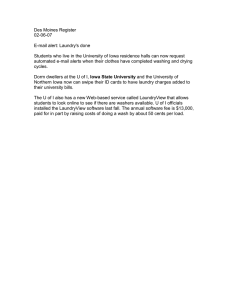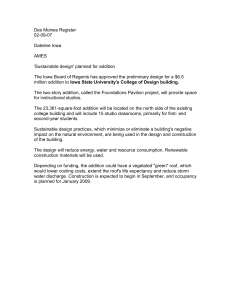Turkish Press, MI 04-08-07 Iowa warning for rock star White House hopes

Turkish Press, MI
04-08-07
Iowa warning for rock star White House hopes
Blockbuster fundraising and "rock-star" candidates are turning the 2008 White
House race into a multi-million dollar popularity contest, but in one place at least, old fashioned, door-to-door politics is clinging on.
Sparsely populated Iowa, icebound in winter, and swathed by golden cornfields in summer, is vowing not to relinquish its disproportionate power in the selection of presidential nominees.
Parables about future presidents touring cafes or sitting on porches in the midwestern state, telling voters how they will change the world, are part of the lore of American politics.
The 2008 race already has its own stories: Hillary Clinton has called a potential supporter in a labor ward, and Republican Rudolph Giuliani has left New York's concrete jungle to pace chilly Iowa streets in search of votes.
Next January, Iowa again gets first chance to chose its favorites, when
Democrats and Republican activists will show up in living rooms, gymnasiums and diners to cast the first state votes for presidential nominees.
Last time around, Iowa played a decisive role: rejecting Democratic front-runner
Howard Dean, and anointing Senator John Kerry, the eventual nominee.
But huge crowds whipped up by celebrity candidates like Barack Obama and
Clinton this year and the Internet's growing power in politics have some Iowans worried the unique caucus flavor is at risk.
Veteran Iowa political reporter David Yepsen declared in February, after Obama arrived with busloads of reporters and drew huge crowds, that "perhaps it's time to write the obit of the living room."
"Rock-star candidates need room for their fans and their gawkers," he wrote in the Des Moines Register.
But a backlash may be stirring, as big money candidates blitz the state.
"Right now, they can hold these big town hall meetings," said Democratic caucus veteran Monica McCarthy.
"But when it comes down to it they are going to have to go town to town, they have to get on those buses and come get those votes."
Caucus goers see their role with almost religious intensity.
"It has become a cliche, but it is not at all unusual for a person to say 'I need to talk to a candidate several times before I make up my mind,'" said Peggy Hubert, a veteran activist.
Republican Sue Clark spent one evening last week taking Giuliani's measure.
"We take a long time to make up our mind ... we are proud of that," she said, as she laid plans to see former Massachusetts governor Mitt Romney the next night.
Iowa State University professor Steffen Schmidt has seen Iowa politics change over 30 years.
He remembers one long-ago day sitting at a farm and watching a couple of cyclists approach up a sun-soaked driveway.
"It was Jimmy Carter ... and he said 'Hi, I'm running for president, how y'all doing?'"
Carter, a political unknown outside Georgia, famously went door to door in Iowa and used a strong caucus showing to vault to the Democratic nomination and the
White House.
Today's hopefuls are trying to show they have the common touch.
Clinton called Iowa state legislator Janet Petersen in the labor ward, just two hours before she gave birth to son Buck.
"I was like, who was calling me," Petersen said and mouthed to her husband "It's
Hillary," the Register reported.
Giuliani meanwhile says his days as New York mayor equipped him perfectly for
Iowa.
"I'm going to run in Iowa the way I ran in New York City," he told supporters last week.
"I walked the streets, I did 93 town hall meetings, I had people come up to me and say, 'Mayor, you are doing a great job,' or 'Mayor, you stink.'"
Obama, Clinton and other big time candidates have scheduled some small invitation-only events in deference to Iowa tradition.
For long-shots like Democratic Senator Joseph Biden, or Republican hopeful
Tommy Thompson, Iowa represents their one and only chance to break through.
Even a major player like former senator John Edwards is betting huge chips on the state, where he currently leads polls, hoping to break up a two-way duel between Clinton and Obama.
"Every time I think that America won't get the president that it deserves, I remember Iowa comes first," Edwards' cancer-stricken wife Elizabeth said in a
Des Moines rally last week.
Some critics say Iowa is so demographically unrepresentative of the rest of
America, it does not deserve its key role. A clutch of states like California and
New York are moving up their primary elections, in a bid to have a say in the process.
But no one knows yet whether that will dilute Iowa's importance, or make it even more important for a candidate to get a strong start.

